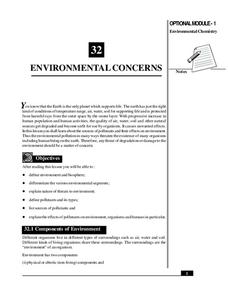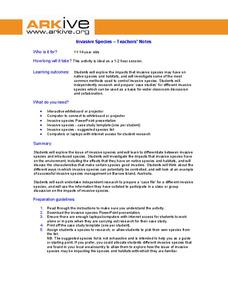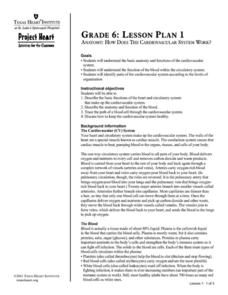Curated OER
Come Shine with Us: Floor Polish Testing and Industrial Science To Teach Critical Thinking
Students discover that science relates to everyday life and see testing procedures used in an industrial laboratory. Students compare various brands of household and industrial floor polishes for specific criteria.
Mascil Project
Parachute Food Drop
Drop a perfect project into your lesson plans. Groups use different building materials to create models of parachutes for food drops. After testing out their prototypes, they make improvements to their designs.
Curated OER
Put A Scientific Spin on Teen Read Week!
Celebrate Teen Read Week by incorporating literature into your science curriculum.
Columbus City Schools
Biome Basics with a Disastrous Twist
Bored with your current biome bag of tricks? This bundle is a bountiful bag of biome fun! Travel the globe with seventh graders and explore the biotic and abiotic factors that define our world's biomes. Then, introduce a little chaos to...
Crafty Classroom
Guided Scientific Method
Guide learners through an experiment with a set of worksheets on the scientific method. Six steps prompt your class to ask questions, conduct research, form a hypothesis, test theories, analyze data, and report results.
Busch Gardens
Create an Invertebrate
What better way for young biologists to learn about invertebrates than by creating their very own? Here, students are assigned a set of invertebrate characteristics and are asked to invent an imaginary ocean animal and a separate...
National Institute of Open Schooling
Environmental Concerns
Every year, more than 14 billion pounds of garbage is dumped into the oceans of the world, most of which is plastic and toxic to ocean life. Lesson 32 in the series of 36 focuses on environmental concerns, specifically pollution. Under...
Pingry School
Synthesis of an Insoluble Ionic Salt: A Stoichiometry Experiment
Challenge young scientists to design their own experimental procedures. They write the procedure for properly preparing two grams of a water-insoluble ionic salt. To finish, they perform the experiment and collect data to prove their...
United Nations
Compost Monitor Training
What should go in the trash, and what can be composted? Guide your young conservationists through the process of composing their trash with a activity about the different ways we can dispose of garbage. Using a trash bag with clean...
SF Environment
Pre-School Composting and Recycling!
You can never be too young to get involved in composting or recycling. Here is a lesson that has been made for the very littlest learners and it's all about the importance of conservation. They'll sort compostable and recyclable objects,...
Weather Bug
WeatherBug
Exploring the weather has never been more intriguing! Whether you are looking for a quick glance at the 10-day forecast, trying to figure out if lightning is heading your way, or wondering what the pollen count is, you will find out...
ARKive
Penguin Diversity – Mask Making
Penguins are very diverse and well-adapted birds; they live on islands, in warm and cold climates. Little ones examine penguin diversity and discuss the highly functional adaptive traits that have helped them survive in some of the...
Curated OER
African Savanna Habitat Diorama Craft
Set the stage for a unit or lesson on the African savanna by creating a cute habitat diorama. Cheetahs, lions, zebras, and elephants are all present in a shoe-box-sized craft that requires your learners to color, cut, and paste. These...
Foundation for Water & Energy Education
What is the Water Cycle? Activity B
Curious physical scientists follow a lesson on the properties of water with this lesson on distillation. They observe a miniature water cycle model that filters dirty water into clean water. These two lessons combined are an enriching...
Mr. Hill's Science Website
Solar System Fact Sheet
Here is a fantastic, educational handout packed with information and facts not only about the planets in our solar system, but also regarding major moons and their surface features, dwarf planets, comets, and asteroids.
National Weather Service
The Water Cycle
Looking for a full-color, labeled water cycle diagram? You found one! From evaporation to precipitation to plant uptake and everything in between, it's all here and beautifully illustrated.
ARKive
Human Impact on the Environment
Study the ways that humans have impacted the environment, particularly the spread of plastic waste. After watching a short film about the Laysan albatross population, learners complete a worksheet and research other ways that plastic...
ARKive
Invasive Species
Learn about how invasive species and introduced species impact the environment around them with a presentation and lesson plan. After viewing the presentation, learners go to the library and computer lab to look up various species and...
Organic Farming
Four Seasons
Celebrate the changing of the seasons with this collection of arts and crafts activities.
Cherokee County Schools
Dragon Genetics
It's alive! Turn young biologists into mad scientists with this engaging genetics activity. Using their knowledge of chromosomes and genes, students create dragons with unique sets of traits, eventually breeding them to make a new...
Outside Education
Plant a Plant in Anything!
Primary graders repurpose items brought from home to create containers for plants. After poking holes in their containers, kids add soil and plant seeds or transplant an item, and then observe and draw conclusions about which items make...
Texas Heart Institute
Anatomy: How Does the Cardiovascular System Work?
How can the circulatory system compare to a city map? Pupils distinguish the "roadways" and "vehicles" of the cardiovascular system, compare the anatomy and function of veins and arteries, and review different types of blood cells with...
Garden Earth Naturalist Club
Parts of a Flower! Flower Dissection
Sometimes the best way to learn about plants is to see the different parts of a plant yourself. Groups of learners dissect flowers to answer questions about what they observe and what they wonder about their flower.
Scholastic
Back from the Dead
If you could bring back one extinct animal, what would it be? That is the question your class will ponder. Your budding scientists read a passage, follow a cloning timeline, and review a diagram about the process of reviving a woolly...
Other popular searches
- 4th Grade Science Project
- Physical Science Projects
- Science Project on Pulleys
- Science Project Volcano
- Science Project Gravity
- Science Project Ideas
- Forensic Science Project
- Science Fair Project Ideas
- Rock Science Project
- Science Project Food
- Science Project Terrarium
- Science Fair Project Data

























